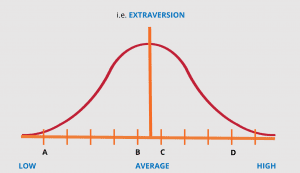Over the past twenty years, more and more organizations are choosing to use personality assessments to develop employees and identify the best job applicants to hire. In fact, 60-70% of all US employers are now using personality assessments. Selecting the right type of assessment is critical to get the most out of your investment and know the results are valid and reliable. But how can you be sure you’re using the right type of assessment?
Not all personality assessments provide the same insights. There are two types of assessments for testing personality — Ipsative & Normative. The differences between these types of tools affect how they should be used for employee screening, selection, training and development.
Understanding the differences will help you choose the best tool for the most effective job you need:
1. Question Choices


Ipsative assessments frame their questions as a forced choice. The participant must choose one option over others. Questions are presented as two or more statements and the user is asked to select the one that best describes them.


Normative assessments frame their questions as a rating-scale choice. The participant is only asked about one statement at a time. The answer they provide is on a scale, allowing them to indicate how much they agree or disagree with the statement.
2. Type of Results
Ipsative assessments display categorical results. This means that assessment-takers are given a ‘category’ or label based on the corresponding answers that they selected most frequently. Depending on the assessment’s model, this can be a color, a number, a name, etc.
In the example below, assessment-takers are classified as an “Introvert” or “Extravert.”. Therefore, person A and B are categorized together as “Introverts” while person C and D are categorized as ‘Extraverts.” However, person B is far more similar to C than they are to A and is only 1 point away from being classified as an Introvert themselves. Yet A and B would receive the same description and be expected to behave and react in similar ways based on these results.


Normative assessments display dimensional results. This means that assessment takers are provided their score on a number of scales that reflect different personality traits.
Normative results do not indicate whether you are Introverted or Extraverted, but rather how much you are introverted vs. extraverted. This provides a more holistic picture of an individual’s personality instead of fitting their personality into a box.
3. Comparison to Others
Ipsative assessments cannot draw comparisons between participants. Ipsative assessments indicate a person’s orientation and strengths only within oneself. There is no context that allows you to draw meaningful conclusions or make comparisons to others.


However, Normative assessments represent the participant on a bell curve. Since conclusions are drawn from a normative scale, the scores are transformed into percentile ranks based on a normative distribution (bell curve) where the majority of the population fall in the middle. Therefore the score is relative to all other assessment takers and allows for meaningful conclusions and comparisons to be drawn.
4. Reliability
Ipsative assessments have low reliability when re-testing, so participants’ scores are likely to change over time. Due to how the forced-choice questions are scored and given categorical results, Ipsative assessments can have a significant discrepancy in results depending on the day the participant takes the assessment. Whereas, Normative assessments have a high reliability when re-testing participants, so their scores will remain stable over time and re-testing, is not likely to change their scores significantly.
5. Use in Organizations
Due to the key considerations highlighted, Ipsative assessments are not suitable for hiring or employment-related decisions. They can be useful for personal development or even team-building, but there are legal ramifications that can arise when using an Ipsative measure for selection procedures.
Normative assessments that are valid and reliable, like TalentClick, are legally defensible for hiring and selection, and other employment-related decisions. You can see the uses of Normative assessments throughout the employee lifecycle in this infographic.
Try our Normative assessments today and see how they can help you hire top-performing employees for your organization today:











